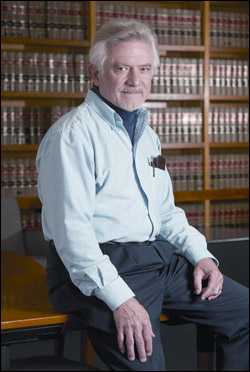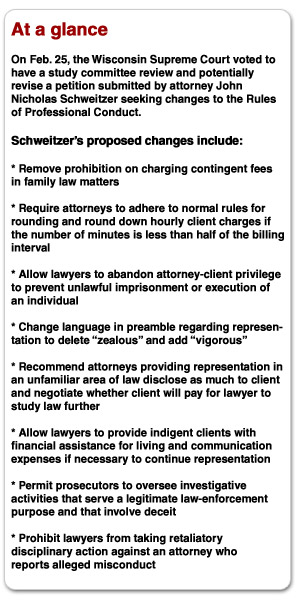Conduct rules questioned
By: Jack Zemlicka, [email protected]//March 11, 2011//

Madison attorney John Nicholas Schweitzer wants his peers to charge less in some instances and accept new fees in others, but he’ll have to get through the state Supreme Court first.
Schweitzer’s recommendations for modifications to the Rules of Professional Conduct come just three years after sweeping changes were made to Chapter 20 of the Supreme Court rules governing attorney ethics. The justices voted Feb. 25 to move forward on Schweitzer’s recommendations, however, and are having him form a study group to evaluate the merits of each change he suggested in a court filing this fall.
The court has yet to issue an order to form the study group.
“One of the common complaints of attorneys is that they don’t communicate enough and don’t work diligently or fast enough,” Schweitzer said. “Many of the proposed changes are to improve relationships between attorneys and clients.”
But some are concerned the recommendations go too far and if adopted, could promote unnecessary litigation and conflicts of interest.
Schweitzer, an adjunct professor at the University of Wisconsin Law School, proposes controversial changes such as rounding down versus up in hourly billing, and allowing contingency fee agreements in family law cases.
Schweitzer said the rounding down change would cut down on the number of billing disputes and promote a sense of fairness to the client.
“I suspect that idea may not go over all that well,” he said, “but I do see overbilling as a problem and I think the whole profession recognizes that.”
The contingency fee suggestion already has at least one challenger: the Family Law Section of the State Bar, which is formally opposing the petition, specifically the contingency fee measure.
Schweitzer’s proposal seeks to strike language in the current rule that prohibits collection of contingent fees in family law matters including divorce, property division, setting of support and maintenance and child custody. But, removal of the ban would give lawyers an inappropriate stake in the outcome of their client’s case, said family attorney Diane Diel, such as entitlement to a percentage of an estate or business owned by a party.
Diel helped craft the current provision which prohibits charging contingent fees in family law cases.
In Wisconsin, marital assets are typically split in half, but in cases involving custody or placement, Diel argued the change could promote the notion that lawyers are putting their interests above those of children.
“What if you make fees contingent on primary custody of children?” she said. “It’s appalling to be gambling on an outcome based on a lawyer’s personal stake in the placement of children.”
Ellen Frantz, chair of the Family Law Section and attorney with Johns, Flaherty & Collins SC in La Crosse, said given the higher stakes, the change would promote more litigation and fewer settlements in family law cases. As it is, she said, most people are willing to compromise on the value of their marital assets to avoid a contentious divorce.
“I don’t think this petition will go anywhere and I don’t think this is something that makes sense in family law,” Frantz said.
 Schweitzer acknowledged the concerns of the family law contingent and said his motivation for promoting the change is based on the idea that the provision is simply a “historical artifact.”
Schweitzer acknowledged the concerns of the family law contingent and said his motivation for promoting the change is based on the idea that the provision is simply a “historical artifact.”
While the ban may have been socially relevant in “preserving the sanctity of marriage” when it was incorporated in the 1980s, he argued that is no longer a compelling reason to maintain the ban.
“The only explanation I’ve seen for that prohibition on contingent fees is a societal interest in the preservation of marriage,” Schweitzer said. “That’s probably no longer as defensible as it once was many years ago.”
Other changes proposed in the 23-page petition include the ability of lawyers to break attorney-client privilege to prevent unlawful imprisonment or execution of someone known to be innocent, and also substituting the word “vigorous” for “zealous” in reference to representation because the latter “encourages a win-at-all-costs approach.”
At first glance, Office of Lawyer Regulation director Keith Sellen said the petition doesn’t appear to recommend any changes that conflict with ethical obligations, but he expected a thorough review of the proposals.
“Nothing really stood out as something that would be problematic,” he said. “My initial reaction is that it will be good for there to be some discussion between Mr. Schweitzer and our Board of Administrative Oversight which reviews policy matters.”
Schweitzer recently retired as an administrative law judge after 20 years, the bulk of which was spent with the Department of Regulation & Licensing. He said he would welcome input from family lawyers, the Office of Lawyer Regulation and the State Bar’s Professional Ethics Committee on his recommendations.
He said the scope of the petition is based in part on class discussions – Schweitzer teaches a class on professional responsibility – regarding a need to evolve the current rules to better meet the needs of attorneys and clients.
“My reason for bringing this is based a lot on my inability to explain to my class why some of these provisions exist,” Schweitzer said. “Some of them make sense and some don’t.”
Jack Zemlicka can be reached at [email protected].
Legal News
- Former law enforcement praise state’s response brief in Steven Avery case
- Eric Toney announces re-election bid for Fond du Lac County District Attorney
- Former Wisconsin Democratic Rep. Peter Barca announces new bid for Congress
- Republicans file lawsuit challenging Evers’s partial vetoes to literacy bill
- More human remains believed those of missing woman wash up on Milwaukee Co. beach
- Vice President Harris returning to Wisconsin for third visit this year
- Wisconsin joins Feds, dozens of states to hold airlines accountable for bad behavior
- Trump ahead of Biden in new Marquette poll
- Bankruptcy court approves Milwaukee Marriott Downtown ‘business as usual’ motion
- New Crime Gun Intelligence Center to launch in Chicago
- Arrest warrant proposed for Minocqua Brewing owner who filed Lawsuit against Town of Minocqua
- Wisconsin Supreme Court justices question how much power Legislature should have
WLJ People
- Power 30 Personal Injury Attorneys – Russell Nicolet
- Power 30 Personal Injury Attorneys – Benjamin Nicolet
- Power 30 Personal Injury Attorneys – Dustin T. Woehl
- Power 30 Personal Injury Attorneys – Katherine Metzger
- Power 30 Personal Injury Attorneys – Joseph Ryan
- Power 30 Personal Injury Attorneys – James M. Ryan
- Power 30 Personal Injury Attorneys – Dana Wachs
- Power 30 Personal Injury Attorneys – Mark L. Thomsen
- Power 30 Personal Injury Attorneys – Matthew Lein
- Power 30 Personal Injury Attorneys – Jeffrey A. Pitman
- Power 30 Personal Injury Attorneys – William Pemberton
- Power 30 Personal Injury Attorneys – Howard S. Sicula











